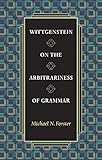Wittgenstein on the Arbitrariness of Grammar / Michael N. Forster.
Material type: TextPublisher: Princeton, NJ : Princeton University Press, [2009]Copyright date: ©2004Edition: Course BookDescription: 1 online resourceContent type:
TextPublisher: Princeton, NJ : Princeton University Press, [2009]Copyright date: ©2004Edition: Course BookDescription: 1 online resourceContent type: - 9780691123912
- 9781400826049
- 121/.68
- online - DeGruyter
- Issued also in print.
| Item type | Current library | Call number | URL | Status | Notes | Barcode | |
|---|---|---|---|---|---|---|---|
 eBook
eBook
|
Biblioteca "Angelicum" Pont. Univ. S.Tommaso d'Aquino Nuvola online | online - DeGruyter (Browse shelf(Opens below)) | Online access | Not for loan (Accesso limitato) | Accesso per gli utenti autorizzati / Access for authorized users | (dgr)9781400826049 |
Browsing Biblioteca "Angelicum" Pont. Univ. S.Tommaso d'Aquino shelves, Shelving location: Nuvola online Close shelf browser (Hides shelf browser)

|

|

|

|

|

|

|
||
| online - DeGruyter The Bells in Their Silence : Travels through Germany / | online - DeGruyter Proving Woman : Female Spirituality and Inquisitional Culture in the Later Middle Ages / | online - DeGruyter Puritans in the New World : A Critical Anthology / | online - DeGruyter Wittgenstein on the Arbitrariness of Grammar / | online - DeGruyter On Adam Smith's Wealth of Nations : A Philosophical Companion / | online - DeGruyter The Reasons of Love / | online - DeGruyter The Good in the Right : A Theory of Intuition and Intrinsic Value / |
Frontmatter -- Contents -- Acknowledgments -- Abbreviations -- Introduction -- PART ONE GRAMMAR, ARBITRARINESS, NON-ARBITRARINESS -- 1. Wittgenstein's Conception of Grammar -- 2. The Sense in Which Grammar Is Arbitrary -- 3. The Sense in Which Grammar Is Non-Arbitrary -- 4. Some Modest Criticisms -- PART TWO. THE DIVERSITY THESIS -- 5. Alternative Grammars? The Case of Formal Logic -- 6. Alternative Grammars? The Limits of Language -- 7. Alternative Grammars? The Problem of Access -- Appendix. The Philosophical Investigations -- Notes -- Index
restricted access online access with authorization star
http://purl.org/coar/access_right/c_16ec
What is the nature of a conceptual scheme? Are there alternative conceptual schemes? If so, are some more justifiable or correct than others? The later Wittgenstein already addresses these fundamental philosophical questions under the general rubric of "grammar" and the question of its "arbitrariness"--and does so with great subtlety. This book explores Wittgenstein's views on these questions. Part I interprets his conception of grammar as a generalized (and otherwise modified) version of Kant's transcendental idealist solution to a puzzle about necessity. It also seeks to reconcile Wittgenstein's seemingly inconsistent answers to the question of whether or not grammar is arbitrary by showing that he believed grammar to be arbitrary in one sense and non-arbitrary in another. Part II focuses on an especially central and contested feature of Wittgenstein's account: a thesis of the diversity of grammars. The author discusses this thesis in connection with the nature of formal logic, the limits of language, and the conditions of semantic understanding or access. Strongly argued and cleary written, this book will appeal not only to philosophers but also to students of the human sciences, for whom Wittgenstein's work holds great relevance.
Issued also in print.
Mode of access: Internet via World Wide Web.
In English.
Description based on online resource; title from PDF title page (publisher's Web site, viewed 08. Jul 2019)


